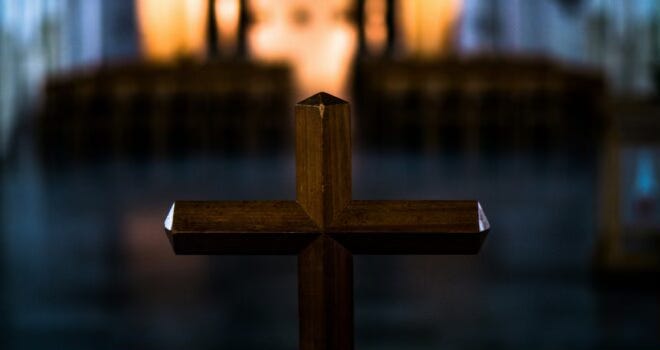I’m publishing a weekly series of reflections at Catholic Exchange during Lent. Here is an excerpt from today’s, along with a link to the full article:
As Pope Benedict XVI observed, our culture’s impoverished and misguided understanding of freedom is reduced to the freedom not to suffer. But Christians should realize that this is a counterfeit freedom: for it is only in Christ’s scandalous Passion, with all its horrors—all the blood, the dirt, the grit, the sweat, the tears—it is only there that we find freedom and peace. True freedom is not found in power, wealth, or accolades—or even in a contented and decent family life, though that is a worthy thing. But those are all limited goods. True freedom requires more, precisely because our ability to be virtuous and faithful is incomplete if it is not rooted in the Cross. There is no Easter Sunday without Good Friday.
We have examples of true freedom in the saints, especially in the martyrs. Terrence Malik’s film, A Hidden Life, tells the true story of a 20th Century Catholic martyr, Blessed Franz Jaggerstatter. Franz was an ordinary husband, father, and farmer living in Austria when Germany invaded during World War II. He was conscripted in the German army, and he was willing to serve. But he was not willing to swear the mandated Oath of Fidelity to Adolf Hitler. His friends and neighbors, the mayor of his town, even the well-meaning parish priest all pleaded with him to be reasonable: just sign it, they told him, even if you don’t mean it. Just a pinch of incense to the emperor, then the authorities will leave you alone.
But Franz could not do this in good conscience. In one pivotal scene in the film, he is being beaten senseless in jail by a prison guard. After intense physical torture, the guard looks down at Franz and says, “just sign it, and you’ll be free.” Bloodied, bruised, unable to even stand up, Franz looks up through his blackened eye and says, “But I already am free…”
When we join Christ on the Cross, there will always remain something in us—the most important part of us—that nothing else can touch, that no malice or evil can ever destroy. In his last letter from prison, just before he was beheaded by the Nazi regime, Franz wrote, “Although I am writing with my hands in chains, this is still much better than if my will were in chains.” It’s not that the Christian martyrs like Franz were especially brave, humanly speaking; they were simply madly in love with Jesus Christ. They learned His Passion in their own lives. That was the source of their supernatural strength.
Click here to read the rest of the article.





Thank you very much Dr. Kheriaty. Many Blessings
Very nicely written and observed. It seems you are moving toward the central theme of Christianity, in agreement with Benedict XVI. The fact that we have become so immersed in worldly viewpoints makes such discussions difficult but therefore all the more valuable. Thanks.